Advice from Dr. Streicher: Are chlorine pools good for your body?
Jul 30th 2024
Posted by Dr. Christoph Streicher and Samantha A.
As the hottest days approach, many are eagerly looking forward to spending lazy days lounging by the pool. However, for those who practice aromatherapy and for those who don’t, the thought of submerging your body in chlorinated water may raise a few concerns. After all, you spend so much time and effort carefully selecting essential oils and natural remedies to improve your physical and mental well-being. So, naturally, you may wonder: Are chlorine pools actually good for your body? The answer isn't as simple as yes or no, as there are valid arguments on both sides of this debate. In this blog post, Dr. Streicher and Amrita’s experts will dive into the potential effects of chlorine on your body and explore whether or not it aligns with a holistic approach to wellness practiced by many aromatherapists and health professionals. Get ready to explore the controversial world of chlorine pools and their impact on your overall health!
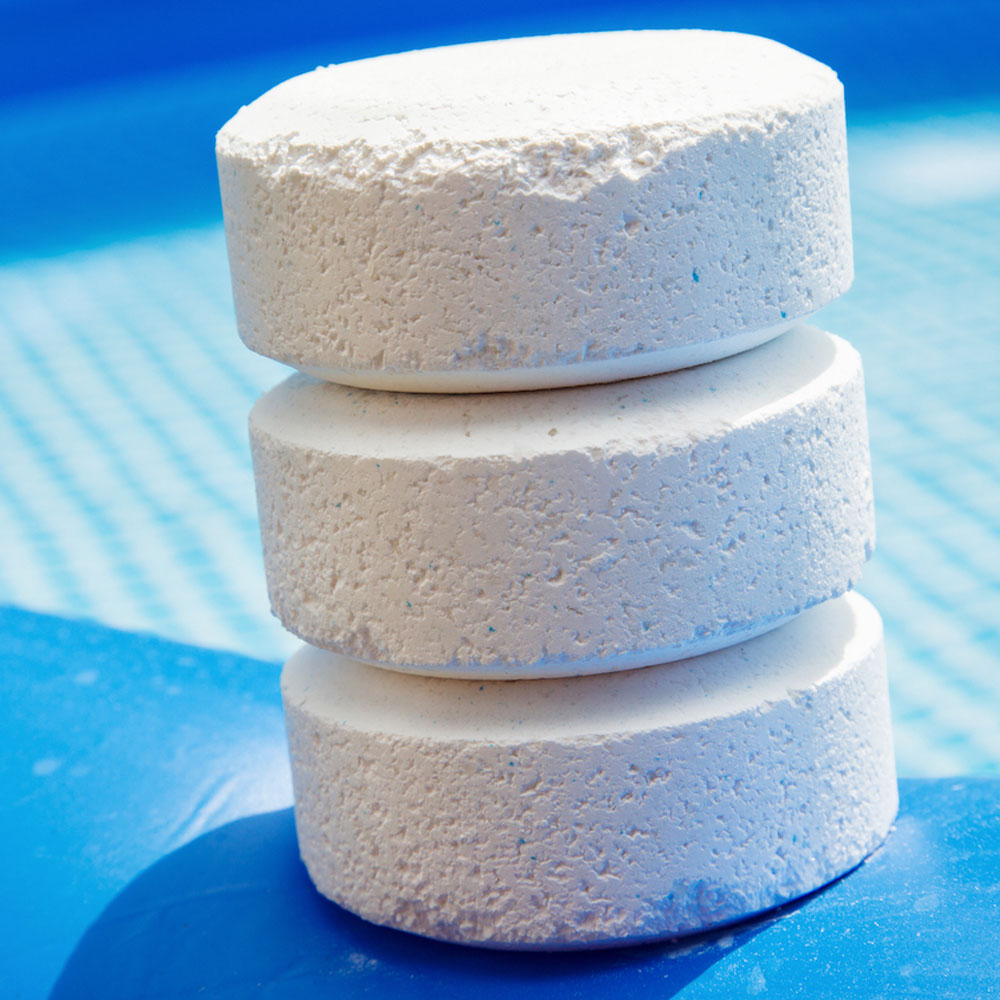
What is Chlorine? How does the body absorb chlorine?
Chlorine is a widely used chemical known for its disinfectant properties. It is most commonly found in pools and hot tubs, where it helps to kill harmful bacteria and maintain a clean environment. Additionally, chlorine is often present in drinking water around the world, playing a crucial role in keeping water safe for consumption.* Despite its benefits in sanitation, chlorine does have side effects that can impact health.
The human body absorbs chlorine through inhalation, ingestion, and skin contact. Even at low levels, chlorine exposure can cause skin irritation, sore throat, and red eyes. Have you ever left a pool with red, itchy eyes or a mild cough? This discomfort is most likely due to the chlorine in the water. Prolonged exposure can exacerbate these symptoms and potentially lead to more serious health concerns.*
While chlorine is effective at keeping water clean, it's important to be aware of its side effects and take steps to minimize exposure, such as rinsing off after swimming and ensuring proper ventilation in enclosed pool areas.
What happens if you swim in a pool with too much chlorine?
Swimming in a pool with excessive chlorine can lead to various health problems, some of which can be quite severe. Here’s a closer look at the potential effects:
- Skin Irritation: High levels of chlorine can dry out and irritate the skin. This can cause rashes, itchiness, and in severe cases, even chemical burns. Those with sensitive skin may notice these symptoms more quickly.
- Eye Irritation: Chlorine can cause redness, stinging, and swelling of the eyes. Swimmers who open their eyes underwater are particularly susceptible to these effects. Prolonged exposure can lead to more significant eye discomfort.
- Respiratory Issues: Inhaling high levels of chlorine vapors can irritate the respiratory system. This can result in coughing, wheezing, and difficulty breathing. Those with pre-existing respiratory conditions like asthma may find their symptoms exacerbated by chlorine exposure.
- Nausea and Vomiting: Accidentally swallowing pool water with very high chlorine levels can upset the stomach, leading to nausea and vomiting. This is particularly concerning for young children who may swallow water unintentionally while swimming.
- Bleached, Damaged Hair and Nails: Chlorine can strip natural oils that your body produces from hair and nails, leading to dryness, discoloration, and damage over time. Swimmers who frequent chlorinated pools often may notice their hair becoming brittle and their nails weakening.
By knowing these potential effects, you’ll be able to take precautions to enjoy swimming while minimizing the potential negative impacts of excessive chlorine exposure.* Let’s discuss what you can do before, during, and after swimming in a chlorinated pool.
Ways to protect yourself from a chlorinated pool
Swimming in chlorinated pools can be refreshing, but it can also take a toll on your skin and hair. Chlorine, while essential for keeping pool water clean, can dry out and irritate your skin. Here are some tips to minimize chlorine absorption and keep your skin healthy:
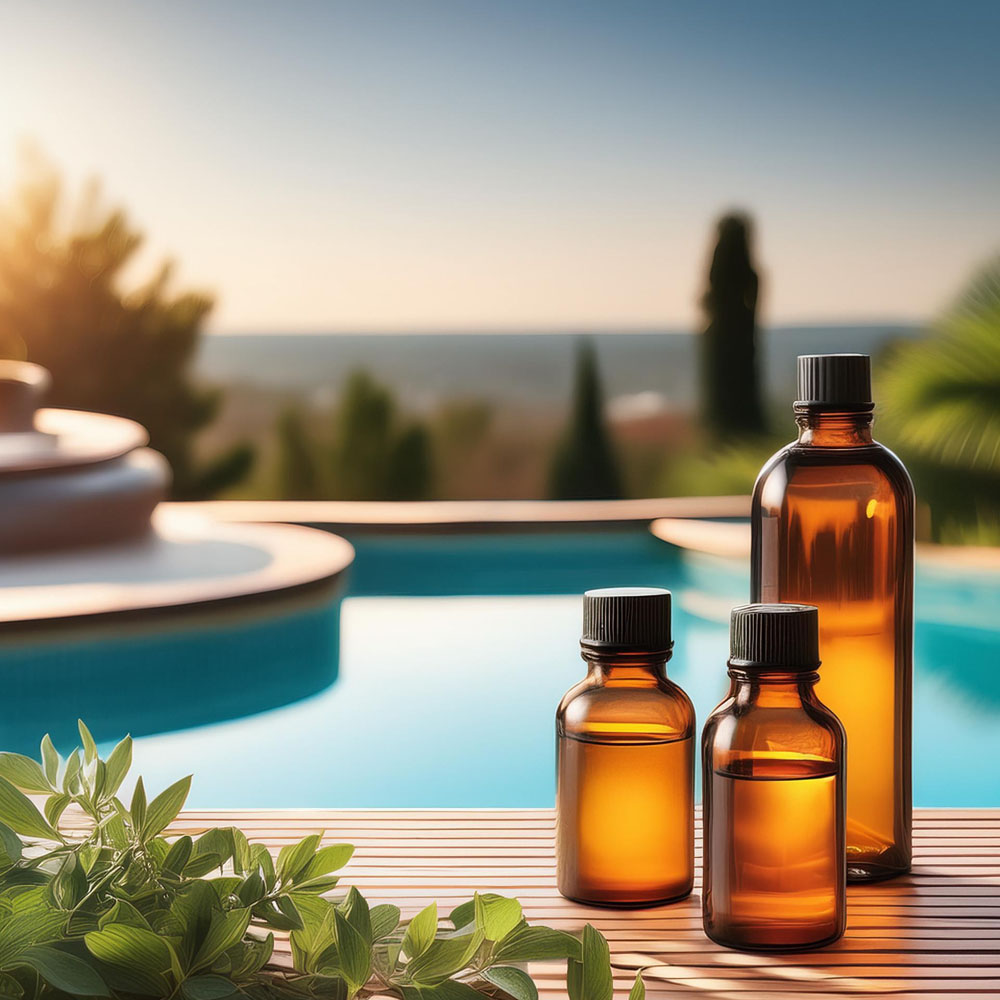
- Pre-Wet Your Skin and Hair: Before getting into a chlorine pool, wet your hair and skin with fresh water. This creates a barrier that makes it harder for chlorine to be absorbed into your skin and hair.* Showering before swimming can help saturate your pores with fresh water, reducing chlorine absorption making a significant difference in protecting your skin.* Additionally, you can wear swim goggles to protect your eyes, and a swim cap can help shield your hair from chlorine damage.
- Apply a Protective Layer: Before swimming, apply a layer of carrier oils like Olive Oil, Almond Oil, Coconut Oil, or Baby Oil to your skin. These oils create a barrier between the chlorine and your skin, while coconut oil additionally hydrates and neutralizes chlorine.* Ensure the oil penetrates well into your skin before entering the pool as these oils make excellent moisturizers and provide a slippery barrier that prevents chlorine from affecting your skin. This process usually takes 15 to 20 minutes.
- Apply a Moisturizer: Applying a screen lotion or a moisturizer with SPF can help reduce chlorine’s impact.* Allow the sunscreen to absorb into your skin for about 15 minutes before entering the pool. Reapply every hour if you stay in the pool for extended periods. Another option would be applying cocoa butter or shea butter. They can keep your skin hydrated and neutralize the effects of chlorinated water.* These butters are excellent for moisturizing and protecting the skin.* If your skin is sensitive to chlorine, consider using a chlorine-neutralizing lotion specifically designed to counteract chlorine’s effects.*
- Vitamin C Intake: Taking a Vitamin C capsule before or after swimming can help your body counteract the effects of chlorine.* Applying a Vitamin C-infused lotion before and after swimming is also beneficial.*
“What should I do after I’ve been in a chlorinated pool?”
To minimize the risks associated with chlorine exposure, it's essential to shower immediately after swimming and limit your time in highly chlorinated pools.* If you experience persistent symptoms, consulting a doctor is advisable. Here are some detailed steps you can follow to protect your skin and hair from chlorine:
- Shower Immediately: Rinse your body and hair thoroughly with fresh water as soon as you get out of the pool. Using a natural soap can help remove any residual chlorine.
- Apply Sunscreen or Moisturizer: After showering, apply a generous amount of sunscreen lotion on all exposed parts of your body, including your ears, lips, and neck.* Use a water-resistant sunscreen with an SPF of 30 or higher. After swimming and showering, moisturize your skin thoroughly.* Chlorine can strip your skin of its natural oils, so using a good body lotion or oil blend is crucial to restore moisture.*
- Use Essential and Carrier Oils: Dilute essential oils with a carrier oil and rub the mixture on the thinner parts of your skin like arms, back, legs, and abdomen. (Feet while known to be porous are the thickest part of your skin and are made for sweating.) Allow the oils to soak in for maximum absorption.* A carrier oil can be any cold-pressed, seed-based oil, ideally organic and unrefined. Good options include Coconut Oil, Avocado Oil, Olive Oil, Sweet Almond Oil, and Grapeseed Oil. You can add any of the following essential oils to get therapeutic benefits:
| — Rose Geranium:
Stimulates cell growth while soothing skin inflammation.* |
| — Lavender: Reduces muscle soreness and pain while
alleviating burns and cuts.* |
| — Tea Tree:
Helps heal wounds, pain, swelling and redness of the skin.* |
| — Myrrh: Aids the healing process for dry, cracked skin
as well as relieves inflamed skin from burns.* |
- Chlorine-Busting Spray: Make a convenient chlorine-busting spray by adding essential oils to a spray bottle. You can spray your hair and body if you aren't able to shower immediately after swimming.* You can also use this chlorine-busting spray after taking a cleansing shower. Below are three recipes you can try for a chlorine-busting spray to neutralize chlorine on your skin and hair.*
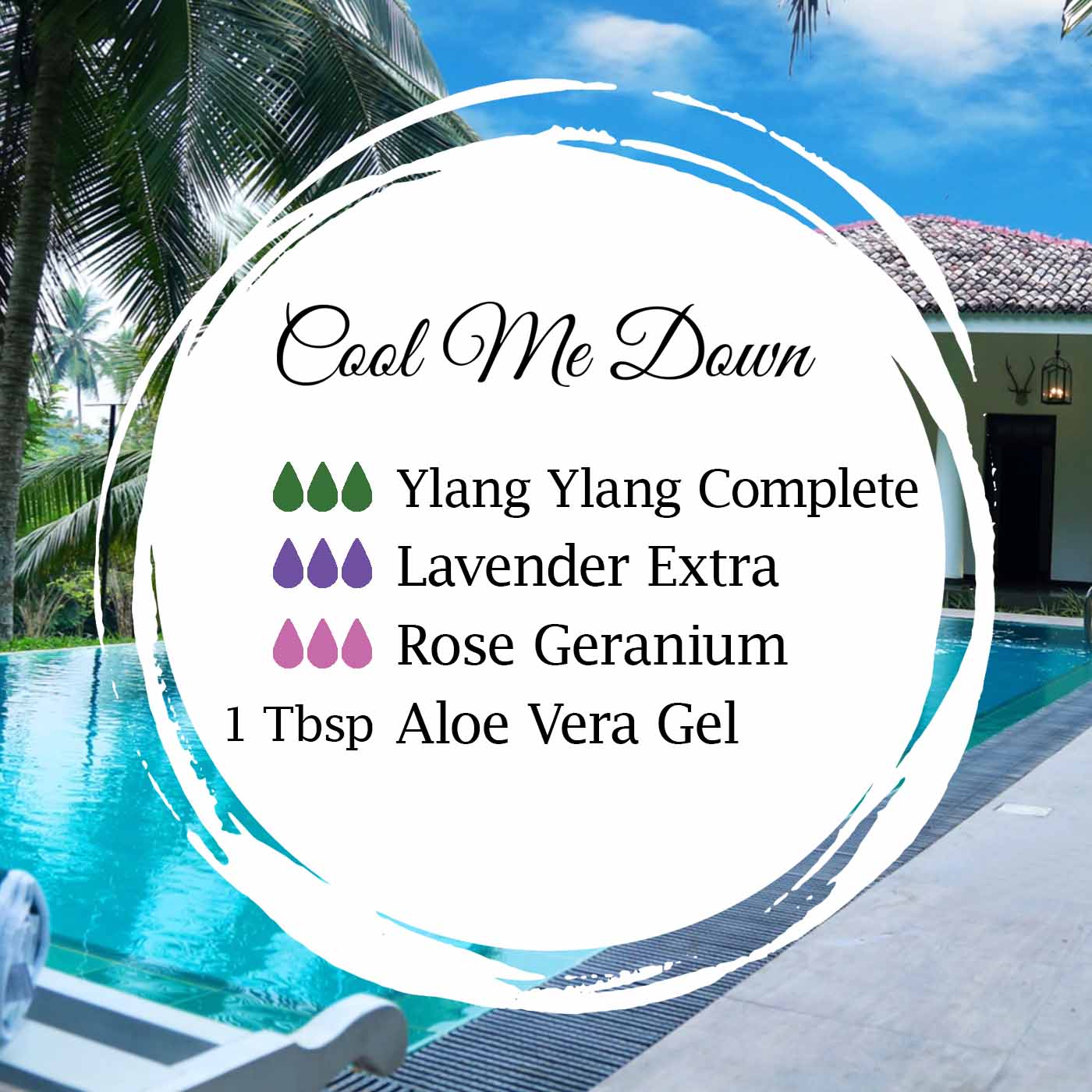 | 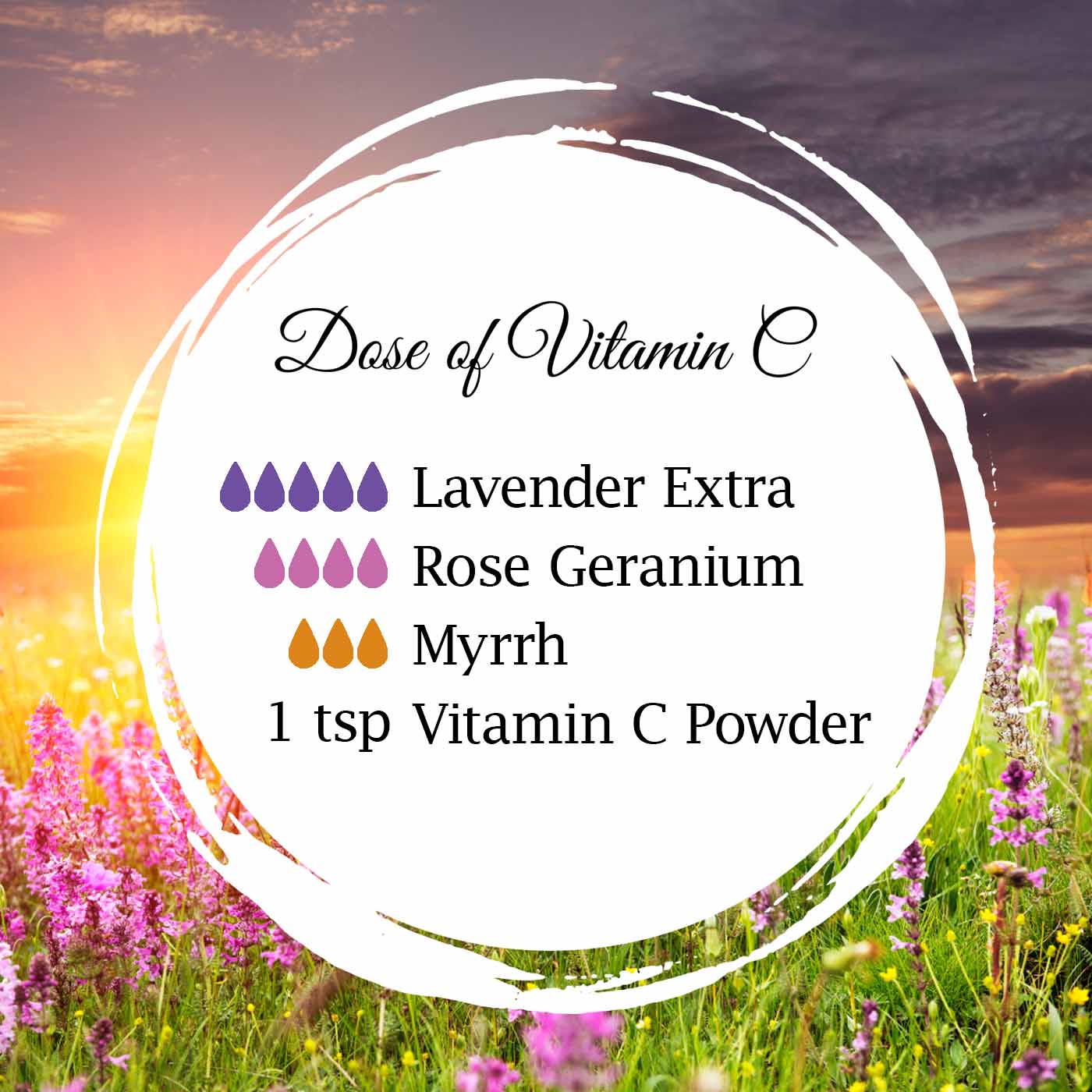 | 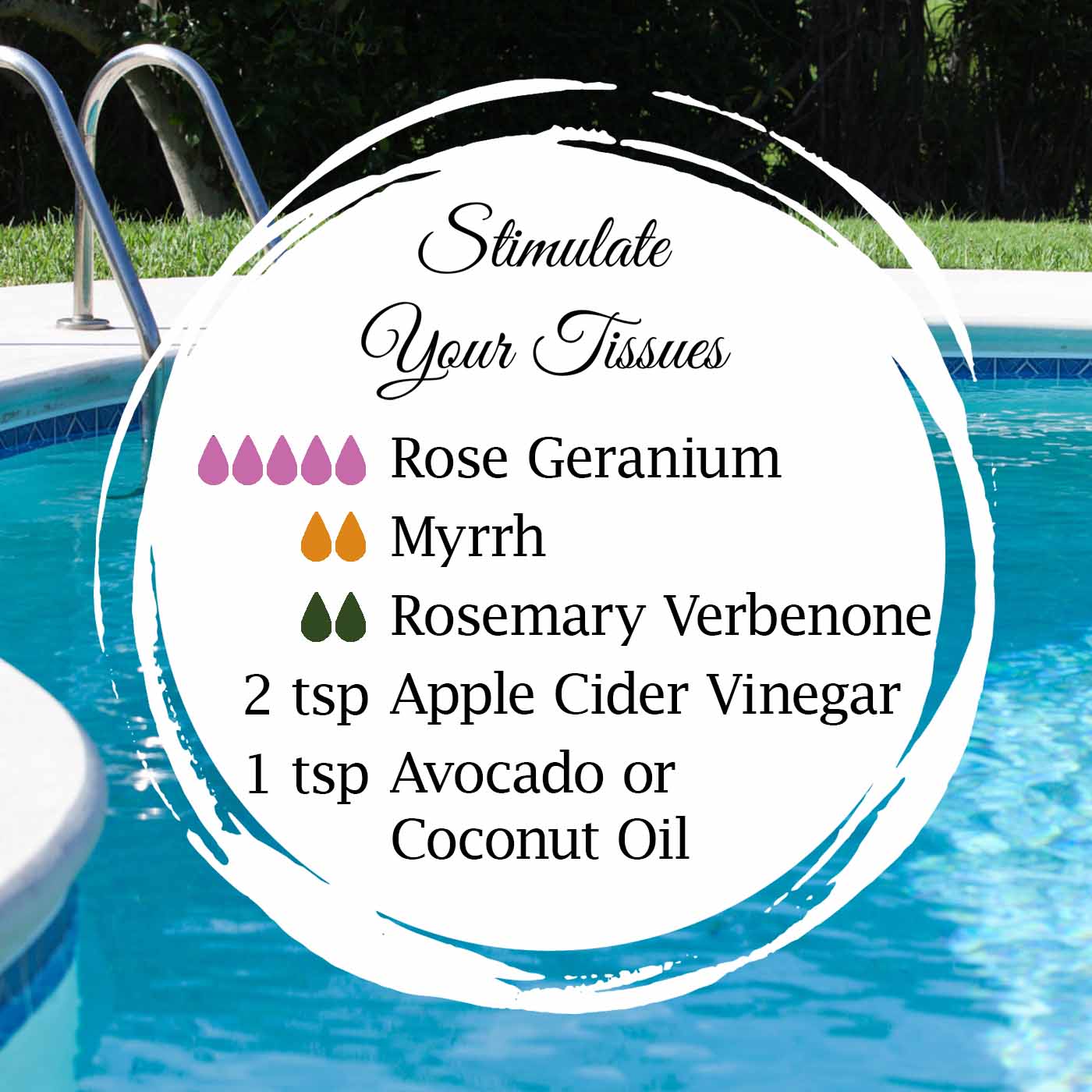 |
Instructions:
- Find a glass 2 oz spray bottle. Remember, it is always best to use a glass spray bottle when using essential oils, as they can break down plastic over time.
- Add all the ingredients to a spray bottle, fill the rest of the bottle with distilled or filtered water, and shake until well combined.
- Shake well before each use to make sure the oils are incorporated.
- Spray on the skin over as much of the body as possible after swimming in chlorinated pools!
Remember, your skin is like a sponge and can absorb pool water, leading to dryness and irritation.* Taking these proactive steps can help protect your skin and hair from the damaging effects of chlorine, ensuring a more enjoyable and healthier swimming experience.
Final thoughts from Dr. Streicher and Amrita’s experts:
Incorporating essential oils into your swimming routine can significantly mitigate the harsh effects of chlorine, ensuring a healthier and more enjoyable experience in the pool. By creating a protective barrier on your skin, essential oils like Lavender, Tea Tree, and Myrrh help to neutralize chlorine, reduce irritation, and maintain your skin's natural moisture balance.* Whether used in pre-swim lotions, post-swim detox sprays, or simply diluted with carrier oils, these natural remedies provide a gentle yet effective solution for safeguarding your skin and hair.* Embrace the benefits of essential oils and make every swim a refreshing and chlorine-free adventure.
*These statements have not been evaluated by the Food and Drug Administration. These products are not intended to diagnose, treat, cure, or prevent any disease.

